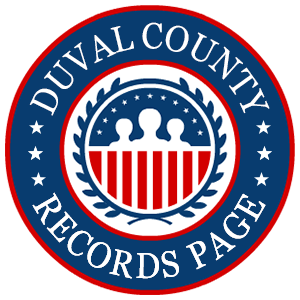Run a free Duval County warrant search today and gain insight into anyone wanted locally.
Florida Sunshine laws mandate that government agencies make many records, including warrant information, available to the public. Citizens can conduct a warrant search for a multitude of reasons. The search tools and resources throughout this article can be used to access warrant information on yourself or someone you know. You can use these tools for specific reasons or to satisfy your curiosity.
Different agencies may provide this warrant information in various ways. This streamlined resource covers the methods by which you can conveniently access warrant information in Duval County, Florida.
This resource was written by Attorney Robert Bailey Jr, who holds a Juris Doctorate from Widener University School of Law.
Conduct a Free Duval County Warrant Search (Overview)
As you prepare to look up warrant information, there are some things you should know before jumping into your first search. By understanding how warrant information is made available, who maintains these records and the type of information you need to present to access these records, you will ensure that your search efforts are effective.
Warrant information is made available to the general public as Florida’s Sunshine Laws require.1 These laws provide broad access to warrant information, although there are restrictions that you need to be aware of. These restrictions are often applied with certain types of warrants more often than others (more information on the various kinds will be provided in a later section).
For example, one exception to warrant information being publicly available is if it could ruin a pending law enforcement investigation. While arrest warrants do not tend to fall under this exception, those for the search of criminal evidence do. Failing to keep an unexecuted search warrant restricted could allow additional criminal behavior.
Another important thing to know is how to access warrant information. You can look up some warrant information online, request it over the phone or conduct an in-person search. You may also submit requests to the record custodians via mail or email.
An online database may require different information than a record request form. However, you will want to know the full name of the person you want to search warrant information about.
Secondly, you will want to know the person’s address or at least what county they reside in. If the warrant was issued somewhere else, you must also know that county so you are searching with the appropriate record custodian.
You may encounter a situation where you do not have this information, or it’s somewhat inaccurate. You may be able to complete your search by providing additional information about the person (e.g., date of birth, height, weight, race) or the warrant itself (e.g., when it was issued and the nature of charges).
The record custodian for warrant information is specific to the county you are searching. In Duval County, warrant information is maintained by the County Clerk.
Some cities and towns issue their own warrants, which can be searched. Duval County largely consists of the city of Jacksonville, and the two have consolidated their governments together. None of the other unincorporated communities in Duval County provide their own warrant information.
The next section will take the information you learned here and put it into action by showing you how to conduct your very own search of warrant records in Duval County.
How To View Duval County Active Warrants
If you want to conduct a warrant search in Duval County, you can use the Clerk of the Circuit Courts online database.2 To search this online database, you will have to create a free account.
To find warrant information, you must use this tool to conduct a criminal case search. To do so, there are a few options you can select under the “case type” drop-down menu, including county criminal, criminal traffic, and felony.
From there, you can enter your available search information. At a minimum, enter the person’s full name. You can also provide the case year and court type (e.g., felony or misdemeanor).
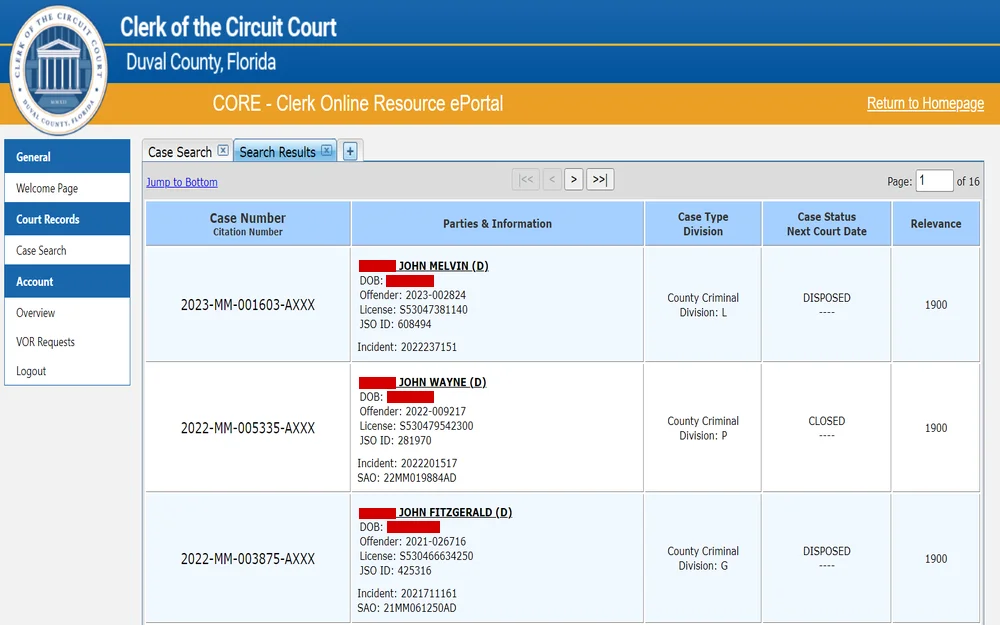
Once you perform your search, you will see a list of matching case numbers along with the person’s name, case type, and next court date (if applicable). You can then click on a record that you want to search for warrant information. On this page you can search through the docket entries to find information on when a warrant was issued and other related information.
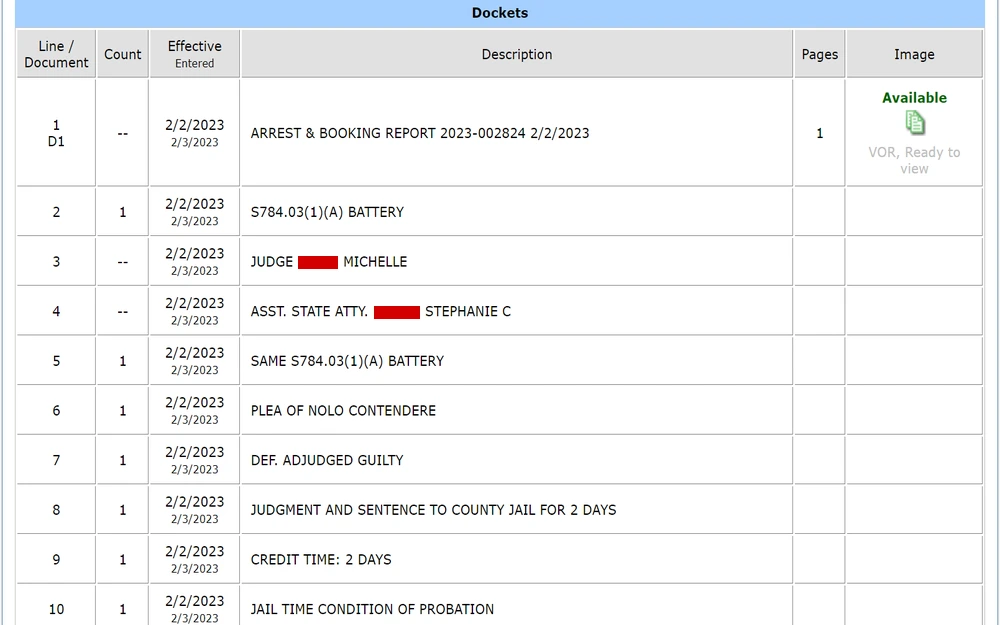
To get complete warrant information, you will have to make a request with the Duval County Clerk.3 You can contact their Public Records Department by phone at 904-255-1828. You can also send a written request or make an in-person search with the Duval County Clerk of Courts at the address below:
Duval County Clerk of Courts
ATTN: Public Records Department
501 W. Adams St., Rm. 2338
Jacksonville, Florida 32202
They are open Monday through Friday from 8:00 AM to 5:00 PM.
You may also be able to find warrant information through the Jacksonville Sheriff’s Office. The city of Jacksonville and Duval County operate as one unified government. You can submit a public records request online.4
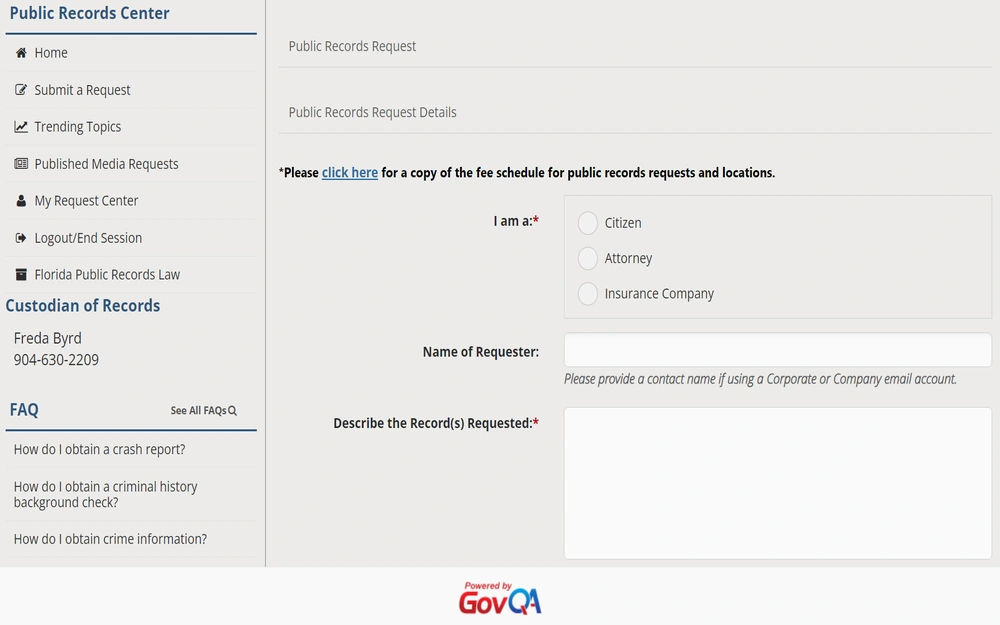
You can also contact their Public Records Unit at 904-630-2209 or by going to the address below:
Jacksonville Sheriff’s Office Headquarters
501 East Bay St.
Jacksonville, Florida 32202
Verify Who Has a Warrant Throughout Florida
In addition to searching at the county level, you also have the option to expand your search throughout the entire state of Florida.
You can obtain criminal history information through the Florida Department of Law Enforcement. You can conduct a statewide warrant search using the Wanted Person Search Tool provided by the Florida Department of Law Enforcement (FDLE).6
To conduct a wanted person’s search, you can insert the person’s full name with the option of including any nicknames (i.e., aliases). You can also specify your search to include the person’s race, sex or date of birth.
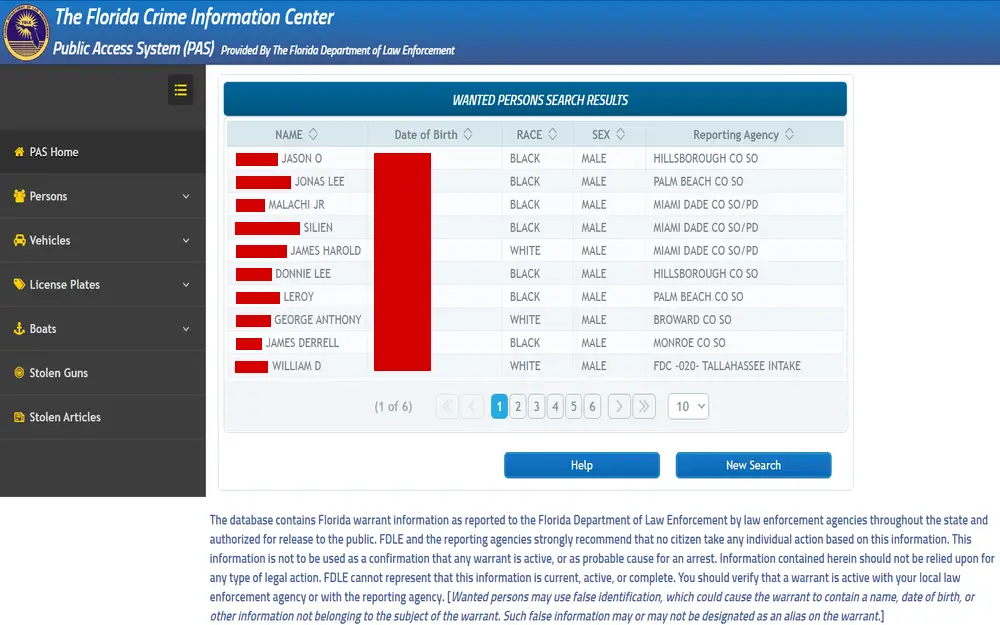
The search results will include the person’s name, date of birth, race, sex and the reporting agency. You can then click on the person you want to search to get the complete online warrant record.
Information on this page includes the date and number of the warrant, along with the reason for its issuance. Other identifying information about the person and their charges can also be viewed here.
If you have additional questions on statewide warrant information, you can contact the FDLE by phone at 850-410-7000 or by talking to someone in person at the address below:7
Florida Department of Law Enforcement
2331 Phillips Rd.
Tallahassee, Florida 32308
Warrant Types & Their Meanings
In performing your search, you may come across types of warrants that you were not previously aware of. There are a variety of warrants that can be issued in Duval County, and they serve different purposes.
To ensure you understand the information you find during your search, use the below information on the different types of warrants in Duval County, Florida.
Search Warrant: This warrant is issued upon the establishment of probable cause that there is evidence of a particular crime at a certain location that is not accessible to the public. A search warrant gives law enforcement the authority to obtain criminal evidence from a particular location. While this warrant information is usually not available until after it is fully executed, it can contain valuable data related to a particular crime.
Arrest Warrant: This warrant is often the most searched and available. Like the search warrant, it is issued by a judge when probable cause is established that a person committed a crime. Once issued, law enforcement is allowed to take that person into custody immediately.
Bench Warrant: Once this warrant is issued, law enforcement is also allowed to take a person into custody immediately. However, the triggering event is a violation of a court order, usually a scheduled hearing date. This type of warrant is issued at the sole discretion of the judge.
Extradition Warrant: This warrant is issued when a person committed a crime in one location and then fled. The warrant allows other jurisdictions to arrest the individual and bring them back to the location that has jurisdiction over handling the criminal matter.
Probation or Parole Warrant: This type of warrant is issued when a person commits an act or fails to fulfill a requirement that was a condition of their probation or parole. This can effectively end the person’s probation or parole and place them back in custody.
Child Support Warrant: Issued for failing to make court-ordered payments as part of a divorce or custody matter.
Capias Pro Fine Warrant: Used when a defendant has a judgment entered against them and fails to pay the court-ordered restitution.
Note: You may see the term “active warrant” during your search process. This simply means the warrant has not been completely resolved yet.
How To Settle an Active Warrant in Duval County Florida
While you now have a good grasp on what is needed to conduct a warrant search, the final question is what you do with this information once you receive it.
For instance, if you find out you or someone you know has an outstanding warrant, you will need to take action (especially for yourself).
So, if you find out that you have an active warrant, first determine the severity and type. As was discussed earlier, there are several different kinds of warrants and some you may be able to resolve without leaving your home.
For instance, a capias pro fine warrant or one for an unpaid traffic violation may be resolved by paying the money due. Or, you may have a bench warrant because you unintentionally missed a hearing, and you can call the court to schedule a new date.
There are also warrants that will require you to turn yourself in or risk greater consequences. First, you should immediately reach out to a licensed criminal law attorney to advise you on your rights and to give you an understanding of how to navigate this process. You may have the option for bail after you turn yourself in.
To speed up this process, you should also contact a bail bondsman. Also, do not forget to let any family members know who may be worried if they cannot get a hold of you for a period of time.
If your search reveals an active warrant for someone you know, you have a few options. If the warrant is for a serious or violent felony, you should go straight to law enforcement. You can submit a tip to the Jacksonville Sheriff’s Office by email at [email protected] or by calling 904-630-0500.8
If the warrant is less serious, you can pass the information along to the person. If they were unaware of the warrant, this could be a great help for them. If you feel uncomfortable letting the person know, consider passing along the information through another person that you both know.
By using this comprehensive resource, you are now prepared to conduct a Duval County warrant search; make sure you also take a responsible course of action with any warrant information you find while searching records in Duval County, Florida.
References
1Florida Legislature. (n.d.). Statute 119 – Public Records. Retrieved January 31, 2024, from <http://www.leg.state.fl.us/Statutes/index.cfm?App_mode=Display_Statute&URL=0100-0199/0119/0119.html>
2Duval County Clerk of Courts. (n.d.). CORE – Clerk Online Resource ePortal. Retrieved January 31, 2024, from <https://core.duvalclerk.com/CoreCms.aspx>
3Duval County Clerk of Courts. (n.d.). Public Information Services. Retrieved January 31, 2024, from <https://www.duvalclerk.com/services/public-information>
4Jacksonville Sheriff’s Office. (n.d.). Customer Support Center. Retrieved January 31, 2024, from <https://jacksonvilleso.mycusthelp.com/WEBAPP/_rs/(S(whicqqjgqixem52wblovxgxo))/supporthome.aspx>
5Jacksonville Sheriff’s Office. (n.d.). Public Records Request. Retrieved January 31, 2024, from <https://jacksonvilleso.mycusthelp.com/WEBAPP/_rs/(S(4ahdkflrrehsjuti42g12dm0))/RequestOpen.aspx?sSessionID=&rqst=1&anon=1>
6Florida Department of Law Enforcement. (n.d.). Wanted Persons. Retrieved January 31, 2024, from <http://pas.fdle.state.fl.us/pas/restricted/PAS/person/WantedPersons.jsf>
7Florida Department of Law Enforcement. (n.d.). Contact Us. Retrieved January 31, 2024, from <https://www.fdle.state.fl.us/Contact-Us>
8Jacksonville Sheriff’s Office. (n.d.). Crime Tips. Retrieved January 31, 2024, from <https://www.jaxsheriff.org/Crime-Tips.aspx>
